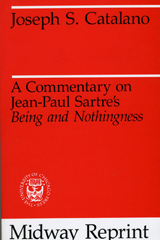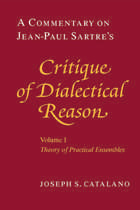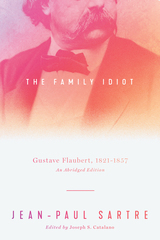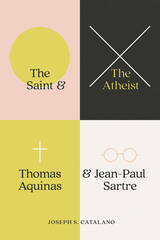4 books about Catalano, Joseph S.

A Commentary on Jean-Paul Sartre's Being and Nothingness
Joseph S. Catalano
University of Chicago Press, 1985
"[A Commentary on Jean-Paul Sartre's Being and Nothingness] represents, I believe, a very important beginning of a deservingly serious effort to make the whole of Being and Nothingness more readily understandable and readable. . . . In his systematic interpretations of Sartre's book, [Catalano] demonstrates a determination to confront many of the most demanding issues and concepts of Being and Nothingness. He does not shrink—as do so many interpreters of Sartre—from such issues as the varied meanings of 'being,' the meaning of 'internal negation' and 'absolute event,' the idiosyncratic senses of transcendence, the meaning of the 'upsurge' in its different contexts, what it means to say that we 'exist our body,' the connotation of such concepts as quality, quantity, potentiality, and instrumentality (in respect to Sartre's world of 'things'), or the origin of negation. . . . Catalano offers what is doubtless one of the most probing, original, and illuminating interpretations of Sartre's crucial concept of nothingness to appear in the Sartrean literature."—Ronald E. Santoni, International Philosophical Quarterly
[more]

A Commentary on Jean-Paul Sartre's Critique of Dialectical Reason, Volume 1, Theory of Practical Ensembles
Joseph S. Catalano
University of Chicago Press, 1986
Sartre’s Critique of Dialectical Reason ranks with Being and Nothingness as a work of major philosophical significance, but it has been largely neglected. The first volume, published in 1960, was dismissed as a Marxist work at a time when structuralism was coming into vogue; the incomplete second volume has only recently been published in France. In this commentary on the first volume, Joseph S. Catalano restores the Critique to its deserved place among Sartre’s works and within philosophical discourse as a whole. Sartre attempts one of the most needed tasks of our times, Catalano asserts—the delivery of history into the hands of the average person.
Sartre’s concern in the Critique is with the historical significance of everyday life. Can we, he asks, as individuals or even collectively, direct the course of our history? A historical context for our lives is given to us at birth, but we sustain that context with even our most mundane actions—buying a newspaper, waiting in line, eating a meal. In looking at history, Sartre argues, reason can never separate the historical situation of the investigator from the investigation. Thus reason falls into a dialectic, always depending upon the past for guidance but always being reshaped by the present.
Clearly showing the influence of Marx on Sartre’s thought, the Critique adds the historical dimension lacking in Being and Nothingness. In placing the Critique within the corpus of Sartre’s philosophical writings, Catalano argues that it represents a development rather than a break from Sartre’s existentialist phase. Catalano has organized his commentary to follow the Critique and has supplied clear examples and concrete expositions of the most difficult ideas. He explicates the dialogue between Marx and Sartre that is internal to the text, and he also discusses Sartre’s Search for Method, which is published separately from the Critique in English editions.
[more]

The Family Idiot
Gustave Flaubert, 1821–1857, An Abridged Edition
Jean-Paul Sartre
University of Chicago Press, 2023
An approachable abridgment of Sartre’s important analysis of Flaubert.
From 1981 to 1994, the University of Chicago Press published a five-volume translation of Jean-Paul Sartre’s The Family Idiot: Gustave Flaubert, 1821-1857, a sprawling masterwork by one of the greatest intellects of the twentieth century. This new volume delivers a compact abridgment of the original by renowned Sartre scholar, Joseph Catalano.
Sartre claimed that his existential approach to psychoanalysis required a new Freud, and in his study of Gustave Flaubert, Sartre becomes that Freud. The work summarizes Sartre’s overarching aim to reveal that human life is a meaningful adventure of freedom. In discussing Flaubert’s work, particularly his classic novel Madame Bovary, Sartre unleashes a fierce critique of modernity as nihilistic and demeaning of human dignity.
From 1981 to 1994, the University of Chicago Press published a five-volume translation of Jean-Paul Sartre’s The Family Idiot: Gustave Flaubert, 1821-1857, a sprawling masterwork by one of the greatest intellects of the twentieth century. This new volume delivers a compact abridgment of the original by renowned Sartre scholar, Joseph Catalano.
Sartre claimed that his existential approach to psychoanalysis required a new Freud, and in his study of Gustave Flaubert, Sartre becomes that Freud. The work summarizes Sartre’s overarching aim to reveal that human life is a meaningful adventure of freedom. In discussing Flaubert’s work, particularly his classic novel Madame Bovary, Sartre unleashes a fierce critique of modernity as nihilistic and demeaning of human dignity.
[more]

The Saint and the Atheist
Thomas Aquinas and Jean-Paul Sartre
Joseph S. Catalano
University of Chicago Press, 2021
It is hard to think of two philosophers less alike than St. Thomas Aquinas and Jean-Paul Sartre. Aquinas, a thirteenth-century Dominican friar, and Sartre, a twentieth-century philosopher and atheist, are separated by both time and religious beliefs. Yet, for philosopher Joseph S. Catalano, the two are worth bringing together for their shared concern with a fundamental issue: the uniqueness of each individual person and how this uniqueness relates to our mutual dependence on each other. When viewed in the context of one another, Sartre broadens and deepens Aquinas’s outlook, updating it for our present planetary and social needs. Both thinkers, as Catalano shows, bring us closer to the reality that surrounds us, and both are centrally concerned with the place of the human within a temporal realm and what stance we should take on our own freedom to act and live within that realm. Catalano shows how freedom, for Sartre, is embodied, and that this freedom further illuminates Aquinas’s notion of consciousness.
Compact and open to readers of varying backgrounds, this book represents Catalano’s efforts to bring a lifetime of work on Sartre into an accessible consideration of philosophical questions by placing him in conversation with Aquinas, and it serves as a primer on key ideas of both philosophers. By bringing together these two figures, Catalano offers a fruitful space for thinking through some of the central questions about faith, conscience, freedom, and the meaning of life.
Compact and open to readers of varying backgrounds, this book represents Catalano’s efforts to bring a lifetime of work on Sartre into an accessible consideration of philosophical questions by placing him in conversation with Aquinas, and it serves as a primer on key ideas of both philosophers. By bringing together these two figures, Catalano offers a fruitful space for thinking through some of the central questions about faith, conscience, freedom, and the meaning of life.
[more]
READERS
Browse our collection.
PUBLISHERS
See BiblioVault's publisher services.
STUDENT SERVICES
Files for college accessibility offices.
UChicago Accessibility Resources
home | accessibility | search | about | contact us
BiblioVault ® 2001 - 2024
The University of Chicago Press









